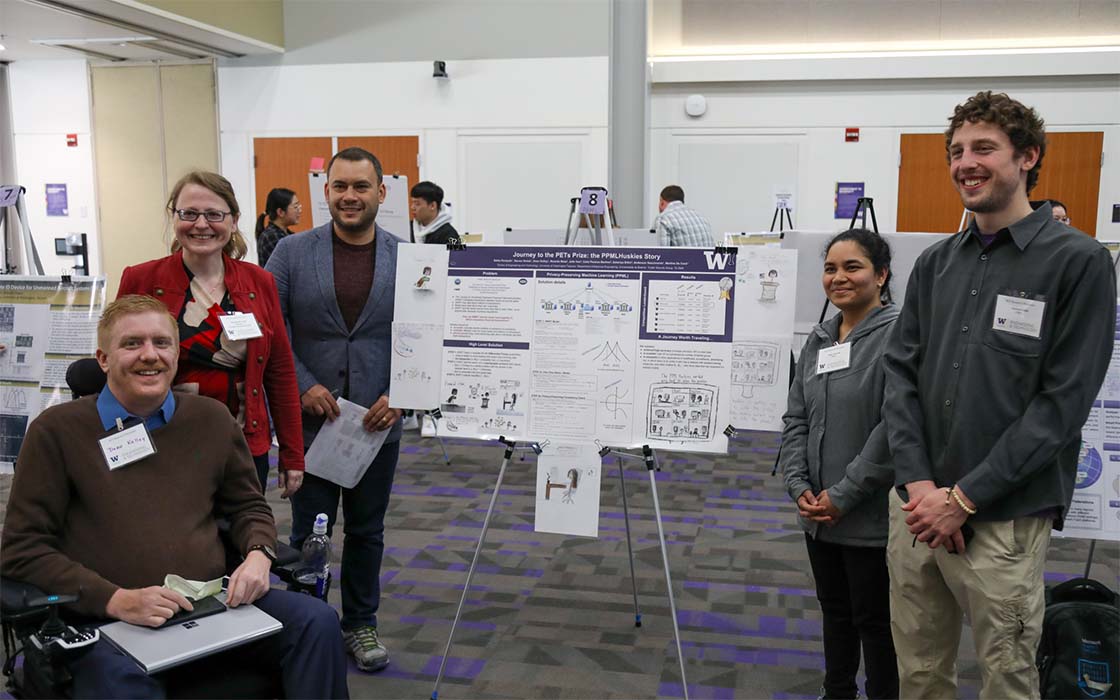
UW Tacoma Team in International Machine-Learning Competition Winners’ Circle
A team including UW Tacoma faculty and students has outperformed dozens of others from government, corporations and universities to claim 2nd prize in the international PETs Challenge.
A multi-national team led by University of Washington Tacoma has placed second in the U.S. in a prestigious artificial intelligence competition.
The team, named PPMLHuskies, consists of faculty and graduate students from UW Tacoma’s School of Engineering & Technology, plus academics from Delft University of Technology in the Netherlands and University of Brasilia in Brazil.
The competition, called the Privacy-Enhancing Technologies Prize Challenges, was announced by the governments of the United States and the United Kingdom at the 2021 Summit for Democracy, with the goal of accelerating the adoption and development of privacy-enhancing technologies (PETs). According to the original competition charge, competitors vied for cash prizes from a combined pool of $1.6 million by developing “privacy-preserving federated learning solutions that enable artificial intelligence models to be trained on sensitive data without organizations having to reveal, share, or combine their raw data.”
U.S. competition prize winners were announced by the White House on March 31, in conjunction with the second Summit for Democracy.
“Participating in this competition was incredibly interesting and, at the same time, very challenging,” said Dr. Martine De Cock, professor of computer science at UW Tacoma and team co-leader. “Students and faculty worked together, literally around the clock, to improve the accuracy of our model while rigorously verifying mathematical claims about the privacy guarantees of our solution. The feeling of that intense level of close collaboration was very unique and easily one of the most unforgettable experiences of my career.”
PPMLHuskies has won 2nd prize for its solution to a challenge involving international money laundering. According to the competition charge, “This illicit activity could be more effectively identified through information sharing and collaborative analytics among financial institutions, but such approaches are made more challenging by legal and technical requirements to ensure customer privacy.”
Competing teams were provided with synthetic data sets of financial transactions created by payment messaging networks such as SWIFT and major international banks. The data was artificial, but realistic. The challenge was to develop a way of using the data to “train” a machine-learning model to look for evidence of financial fraud in the transactions, without disclosing bank or personally-identifiable information. For their solution, the PPMLHuskies team designed and used highly-optimized state-of-the-art cryptographic and differential-privacy algorithms.
Callout box: Read about the technology behind PPMLHuskies winning solution and what team members said about the competition experience.
In phase one of the competition, 70 teams submitted technical concept papers proposing their privacy-preserving solutions. The teams represented major universities and research corporations such as MIT, Harvard Business School, University of Cambridge, Visa, IBM, University of Texas Austin and University of Toronto, as well as UW Tacoma. From the pool of entrants, judges selected a smaller number of teams, including PPMLHuskies, to participate in phase two, to actually develop working prototypes of their solutions. The top prototypes were then subjected to attacks meant to reveal privacy vulnerabilities.
Many high-ranking science and technology policy leaders in the U.S. and UK commented on the significance of the competition and the achievement of the winners. “We are thrilled that the PETs prize challenge is galvanizing innovation and helping the research community close gaps and accelerate broader adoption of privacy-enhancing technologies,” said U.S. National Science Foundation Director Sethuraman Panchanathan in a release.
“I am excited by the solutions proposed by these scholars and look forward to their impact on enhancing privacy and bolstering trustworthy AI,” said National Institute of Standards and Technology Director Laurie E. Locascio.
“I’m thrilled that we’re … motivating our best researchers in industry and academia to innovate on protecting privacy so that we can all reap the benefits,” said U.S. Secretary of Commerce Gina Raimondo.
The members of the PPMLHuskies team include Dr. Martine De Cock, professor of computer science; Dr. Anderson Nascimento, associate professor of computer science; computer software and systems Ph.D. students Sikha Pentyala and Steven Golob; Dean Kelley, master’s student in computer software and systems; Dr. Zekeriya Erkin, associate professor, and Jelle Vos, Ph.D. student, at Delft Technical University in the Netherlands; and Ricardo Maia, Ph.D. student at University of Brasilia in Brazil.
The 2nd-prize award comes with $50,000. Winners have been invited to an in-person “Demo Day,” to demonstrate their solution and network with other members of the privacy-preserving community. Organized by the UK Department for Science, Innovation and Technology, the event will be held in London in May. PPMLHuskies has also been invited to release its prize-winning solution as open-source code, for which the team will receive an additional $20,000.
The plan, according to Dr. De Cock, is to plow the $70,000 competition award right back into privacy-preserving machine learning research at UW Tacoma.



